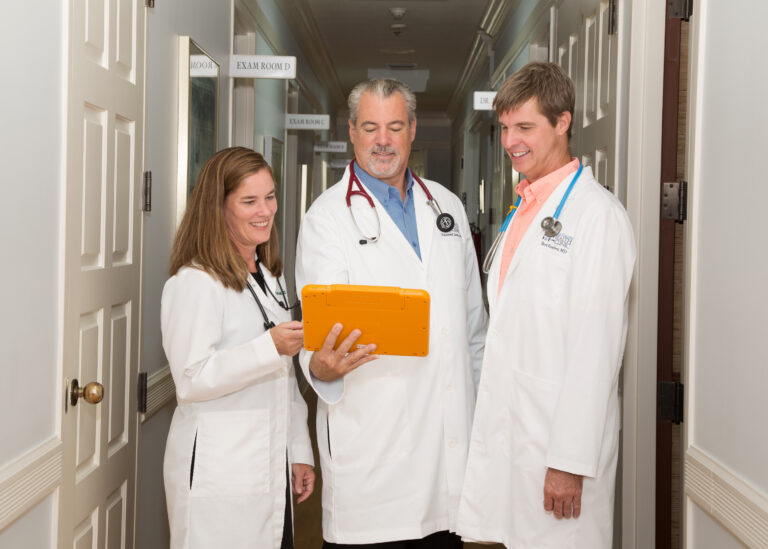
How healthy is your heart?

Cardiovascular disease (CVD) is the leading cause of death in the United States, according to the latest statistics from the American Heart Association (AHA). To put this in perspective, on average, someone in the U.S. dies of CVD every 34 seconds. Every 3 minutes and 17 seconds someone dies of a stroke.
There are several factors – including family history, age, gender, race, cholesterol, blood pressure, smoking history and diabetes – that contribute to the risk of developing CVD. Let’s look at just one: cholesterol.
The highs and lows of cholesterol
When it comes to cholesterol, numbers matter. Cholesterol travels through your blood on proteins called “lipoproteins.” Two types of lipoproteins carry cholesterol throughout the body:
- LDL (low-density lipoprotein) cholesterol, sometimes called “bad” cholesterol, makes up most of your body’s cholesterol. When your body has too much LDL cholesterol, the LDL cholesterol can build up on the walls of your blood vessels. This plaque buildup may lead to heart attack, stroke and heart failure.
- HDL (high-density lipoprotein) cholesterol, or “good” cholesterol, absorbs cholesterol in the blood and carries it back to the liver. The liver then flushes it from the body. High levels of HDL cholesterol can lower your risk for heart disease and stroke.
Basically, you want your LDL number to be as low as possible and your HDL to be as high as possible.
The average LDL (low-density lipoprotein, often called the bad cholesterol) in the U.S. is close to 130. Average should not be confused with what’s normal. When you’re born, your LDL is 30! So, how low should you go? Experts say, “the lower, the better.” Experts now recommend an LDL cholesterol level under 50 for high-risk individuals, much below the previous 70. There are many good pharmaceutical therapies available to lower LDL.
When it comes to HDL, 60 or higher is optimal. There are no drugs that can raise your HDL, but there’s plenty you can do on your own to increase it, including stopping smoking, maintaining a healthy weight, eliminating trans fats from your diet and exercising.
Walking is a simple and abundantly available exercise here on the Island, and it’s so good for you. In fact, peer-reviewed studies published in the Journal of the American Medical Association, older adults who walk three to four miles per day—6,000 to 9,000 steps—are 40 to 50 percent less likely to suffer a heart attack or stroke than those who walk a mile (2,000 steps) per day.
Good heart health promotes better brain health
If you need more reasons to improve your heart health, the AHA just last week released results of a study that found that improving heart health in midlife and beyond was associated with a lower prevalence of stroke and dementia risk factors around two decades later.
While the findings are considered preliminary until full results are published in a peer-reviewed journal, what has been discovered is promising. For example, from midlife to late life, those in the study who maintained ideal cardiovascular health had 33 percent lower odds of brain microbleeds and 37 percent lower odds of having infarcts compared to people whose scores declined.
Regular checkups and screenings can identify risk early
February is Heart month, the time to celebrate the ones you love and the heart that loves them. With this in mind, I urge you to get regular checkups and talk to your doctor about any family history of high cholesterol, diabetes and heart issues that could put you at high risk for coronary disease.
More Recent Healthcare News

Every year we celebrate Doctor’s Day and Nurses Week, but there’s one more recognition event that’s just as important. Administrative Professionals Day is April 24th this year and I want to be sure to bring special attention to three incredibly special members of the Boca Grande Health Clinic family. Jonna Foos, Director of Operations Jonna […]

April, the birth month of James Parkinson, is Parkinson’s Disease Awareness Month. Parkinson’s is a degenerative syndrome that results in the gradual loss of brain circuitry involved in movement, thinking and behavior. According to the National Institutes of Health (NIH), the first clear medical description of Parkinson’s Disease as a neurological condition was written in […]

March 30th marks a special day on our calendar – Doctor’s Day! It’s a time to honor those who dedicate their lives to caring for us. At the Boca Grande Health Clinic, it’s the extraordinary team of board-certified physicians – Dr. Raymond A. James, our Medical Director; Dr. Bret Kueber, the Assistant Medical Director; and […]

Ask a Doc: Kicking Colon Cancer in the Butt
March 22, 2024According to the American Cancer Society, the lifetime risk of developing colorectal cancer is about 1 in 23 for men and 1 in 25 for women. The death rate from colorectal cancer has been dropping in older adults for several decades. Unfortunately, colorectal cancers now rank as the leading cause of cancer death in men […]

